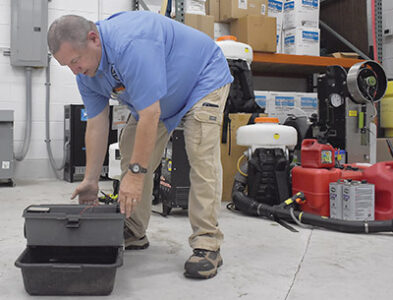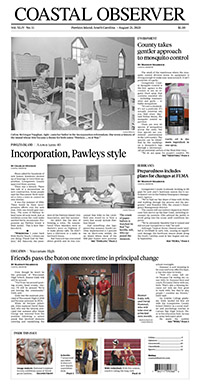Environment
County takes gentler approach to mosquito control

The smell of the warehouse where the mosquito control division stores its equipment is strong enough to make your nose scrunch. It isn’t pesticide, it’s garlic.
Georgetown County Mosquito Control is the first agency in the country to use an organic truck spray that contains essential oils – including rosemary, mint and garlic – to battle mosquitoes.
“It’s not a chemical. It’s not a pesticide. It’s actually essential oils you find every day,” said Roban Mears, the mosquito control supervisor.
There are over 60 species of mosquitoes across the state, but four species are considered predominant in the Lowcountry. The species can be identified by the markings on a mosquito’s legs through a microscope. All are potential carriers of the West Nile virus.
“We do not spray for people’s comfort. We don’t spray so that mosquitoes won’t bite you,” Mears said. “We spray to stop the spread of disease.”
This week, the staff is collecting samples of mosquitoes to send to the state Department of Public Health and the federal Centers for Disease Control and Prevention to test for diseases, according to Zack Parsons, a senior technician with Mosquito Control. Samples are collected in traps. The dead mosquitoes are frozen and sent off for testing.
Mosquitoes lay eggs in water so ditches and puddles are priority areas to inspect and treat. One female can lay approximately 100 eggs within a bottle cap.
This year, Georgetown County has recorded over 25 inches of rain at the airport, where Mosquito Control is based. July is typically the wettest month and even the typical dry areas could see mosquitoes hatching in the matter of a few days.
“Right now, because it just has continued to rain almost daily for the last three weeks, there’s this constant hatching out,” Mears said. “Those are the ones that may give us the most problems.”
Even if the group used a wholesale, deadly spray to treat the influx of mosquitoes, more would hatch in days after doing so. That’s why the group goes out daily to treat areas to kill the mosquito larva and the adults.
The adulticide spray is used more as a repellent that’s dispersed via truck. The spraying is done under a permit from Public Health and the state Department of Environmental Services. It’s a mixture of a product called Mosquito Magician and surfactin, an organic compound that helps it absorb into plants.
It’s not Mosquito Control’s goal to eradicate them. Mosquitoes are a part of the Lowcountry ecosystem. Using an insecticide increases the chances of killing other creatures such as honeybees or butterflies.
“We feel like our method does what it’s supposed to do,” Mears said.
That’s another reason why Mosquito Control avoids aerial spraying that uses an insecticide called naled, which bears the skull and crossbones symbol on each barrel.
“We don’t put the plane in the air unless it’s absolute,” Parsons said. “We don’t want to affect anything else.”
Mosquito Control resorts to aerial spraying when the trucks can no longer control the adult population. The aerial spray is done through Williamsburg Air, based in Kingstree, that disperses a diluted solution that contains less than one ounce of naled per acre.
“That is what we call ‘the bombing,’” Mears said. “It kills all insects it comes in contact with.”
Some larvacides kill the larva and some prevent them from reaching adulthood. Mosquito Control uses a product called Skeeter, specifically in ditches and swampy areas, that uses nematode technology where microscopic organisms target different species of insects. It’s essentially a garlic oil that they mix with water.
Mears, Parsons and Darrell Gardner make up the Mosquito Control division. With the help of four part-time truck drivers they cover 41 routes across the 1,000 square miles of land and water in the county. Charleston County has about 1,400 square miles and a mosquito control staff of 30, Mears said.
Mosquito Control staff also work as stormwater inspectors for the county.
“That gives us a little bit of advantage because when we’re inspecting a site, we can also observe the mosquito activity at that particular area,” Mears said.
Mosquitoes don’t travel far or live long. If you have a large mosquito population around your home, Mears said, that’s an indication of a standing water where mosquitoes can breed. Birdbaths, old tires, pet water bowls and swimming pools are common sites where mosquitoes breed.
“They don’t need much,” Mears said.




